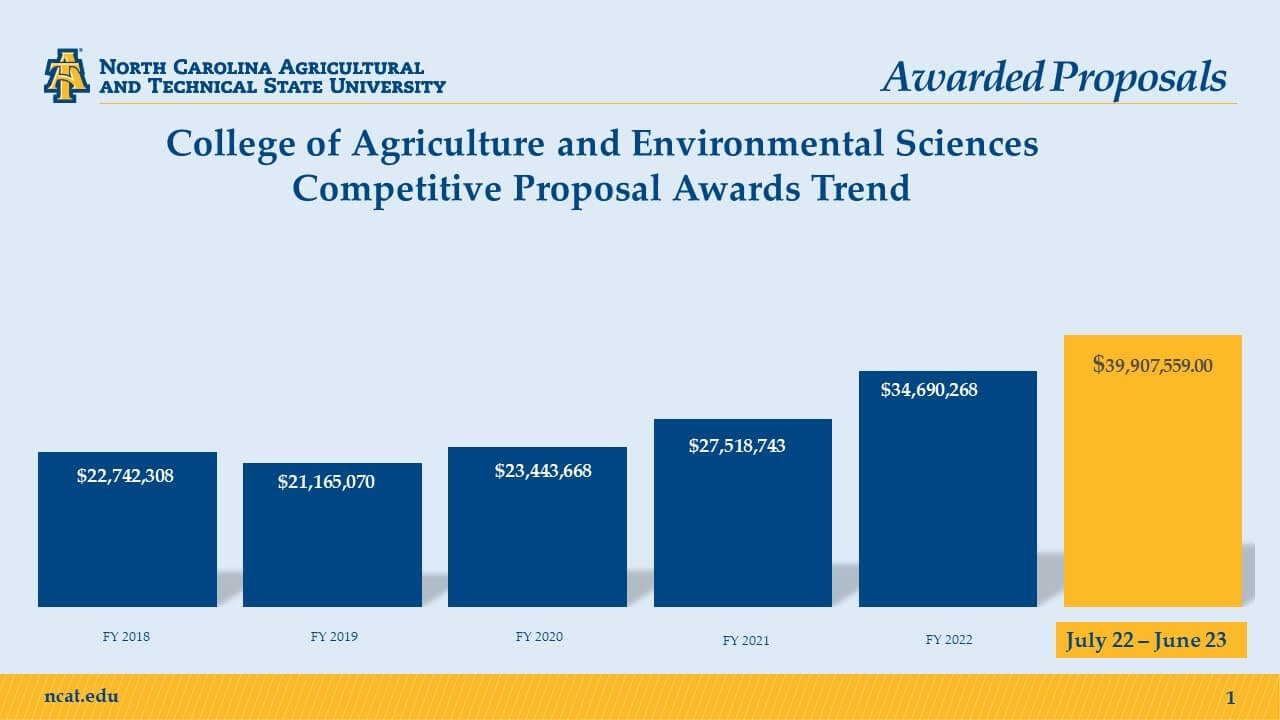
Faculty Chosen for CAA’s AI Technologies Champion Network, Inaugural Award
02/25/2026 in Academic Affairs, Research, College of Agriculture and Environmental Sciences, College of Engineering
A Duke Energy Scheduled Power Outage, Steam Plant Maintenance Will See A&T Move To Condition 2: Suspended Operations on March 4 Read More
By Lydian Bernhardt / 09/08/2023 Research, College of Agriculture and Environmental Sciences
EAST GREENSBORO, N.C. (Sept. 8, 2023) – Research funding in the College of Agriculture and Environmental Sciences (CAES) at North Carolina Agricultural and Technical State University reached an unprecedented $39.5 million this year, buoyed by major projects funded by the U.S. Department of Agriculture and the American Heart Association.
This year’s gain, an increase of more than $5 million from 2021-22, accounts for nearly one third of the university’s overall $147 million research portfolio. This is the fourth year research funding has climbed in the college, said Dean Mohamed Ahmedna.
“The college is moving into digital, or “precision,” techniques, an emerging area that will play a pivotal role in the future of U.S. agriculture,” Ahmedna said. “This is one of our research priorities and will be a boost to our state’s $103 billion economic enterprise.”
Faculty and staff secured nearly 100 grants and contracts in 2022-23, including these key projects:
“The upward competitive grant funding trend allows our agricultural research activity to support a new generation of empowered small farmers contributing to thriving rural communities. For instance, we envision a future of climate-resilient agriculture in rural North Carolina,” said Gregory Goins, Ph.D., CAES associate dean for research.
In addition, the college is expanding its researching and testing of “precision agriculture” techniques, a term which refers to the application of modern information technologies to provide, process and analyze data to operators to inform their practice.
Precision dairy technology, for example, such as the University Dairy’s new Automated Milking System, assists producers in adjusting to the needs of individual animals and conditions, saving unnecessary expense and resources, and "personalizing” animal care. Each cow is monitored and becomes uniquely “known” to the system, allowing dairy operators to become aware of problems – and solve them – mmore quickly.
Drone data-gathering technology assists growers as well, providing area-specific soil and plant information, allowing each plant to receive “individualized” attention.
“This agriculture fits the lifestyle of the digital age,” Goins said. “Our research will help make digital agriculture translatable to the small farmer and help youth, who are so well-versed in this type of technology, participate in agriculture.”

Media Contact Information: llbernhardt@ncat.edu